The Catholic Church plays a significant role in shaping Filipino society and politics. Its influence dates back to the 16th century when it introduced its teachings, which have since informed moral frameworks and community practices.
The Church's activism emerged during colonial times. For instance, it supported national movements, such as the People Power Revolution, demonstrating its commitment to social justice.
The Church advocates for marginalized communities, influencing legislation on human rights and governance issues.
Recent political endorsements indicate a shift towards active participation in elections. This involvement highlights the complex relationship between the Church and political power, underscoring its lasting influence on the Philippines.
Historical Background of Catholicism
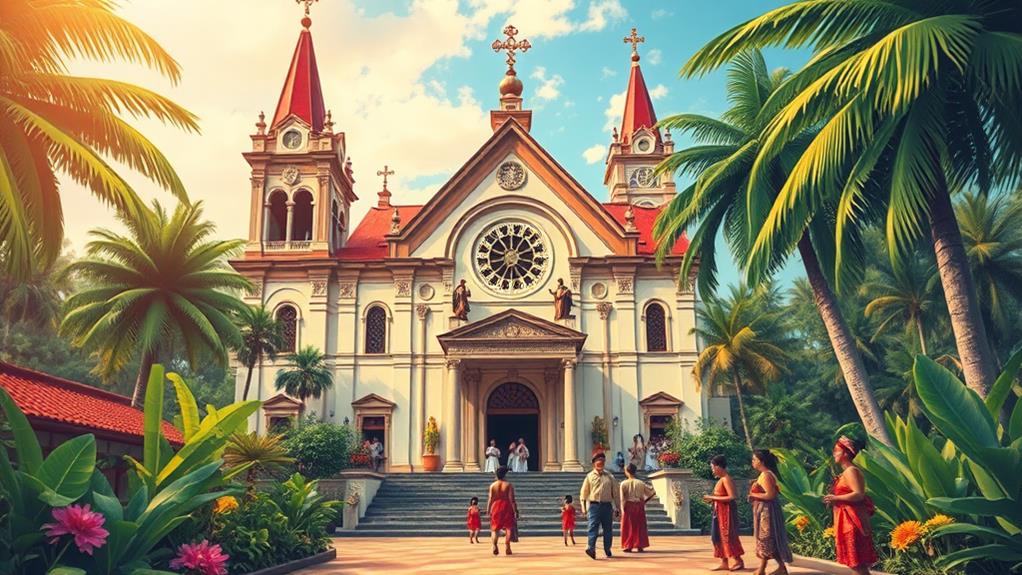
Catholicism's Arrival in the Philippines
In 1521, Catholicism arrived in the Philippines, marking a significant turning point in the archipelago's history. By 1546, approximately 250,000 conversions were recorded, demonstrating the religion's rapid spread.
Catholicism's Influence on Filipino Culture
During the Spanish colonial period (1565-1898), Catholicism became the dominant religion, greatly influencing Filipino culture, traditions, and identity.
Key religious orders, such as the Augustinians, Franciscans, Jesuits, and Dominicans, established schools, hospitals, and infrastructure, facilitating cultural exchanges and laying the groundwork for the Filipino educational system.
Criticisms of the Church
The Church's intertwining with colonial authorities led to critiques from Filipino intellectuals.
José Rizal's novel "Noli Me Tangere" exposed the corruption and abuses prevalent within the Church, framing them as reflections of colonial oppression.
Catholicism's Legacy in the Philippines
Despite challenges posed by emerging religious sects, the legacy of Catholicism in the Philippines continues to shape social and political dynamics.
The Church remains actively engaged in social justice issues, advocating for the marginalized and influencing community development.
This historical context underscores Catholicism's profound impact on Filipino society, which persists well into contemporary times.
Role in Nationalism and Independence
The Catholic Church's complex relationship with nationalism in the Philippines was rooted in its historical ties to colonial authority.
The Church's connection to Spanish rule positioned it as both a unifying force and a target of nationalist sentiments. The martyrdom of GOMBURZA (Fathers Mariano Gomez, Jose Burgos, and Jacinto Zamora) in the late 19th century sparked nationalist movements against Spanish rule. This event, combined with José Rizal's critique of the Church's corruption and abuses in "Noli Me Tangere," fueled anti-clerical feelings among Filipinos.
As the Philippine Revolution of 1898 unfolded, the Church's influence waned, becoming synonymous with oppression in the eyes of many. During the American colonial period, the Church remained influential in shaping societal values and political discourse, despite the government's promotion of church-state separation.
In 1986, the Church played a crucial role in advocating for human rights and mobilizing the masses against the dictatorship of Ferdinand Marcos during the People Power Revolution. This dual role of the Church – as both a defender of faith and a participant in the struggle for independence and democratic ideals – is a testament to its complex relationship with nationalism in the Philippines.
Church Relations During the Marcos Era
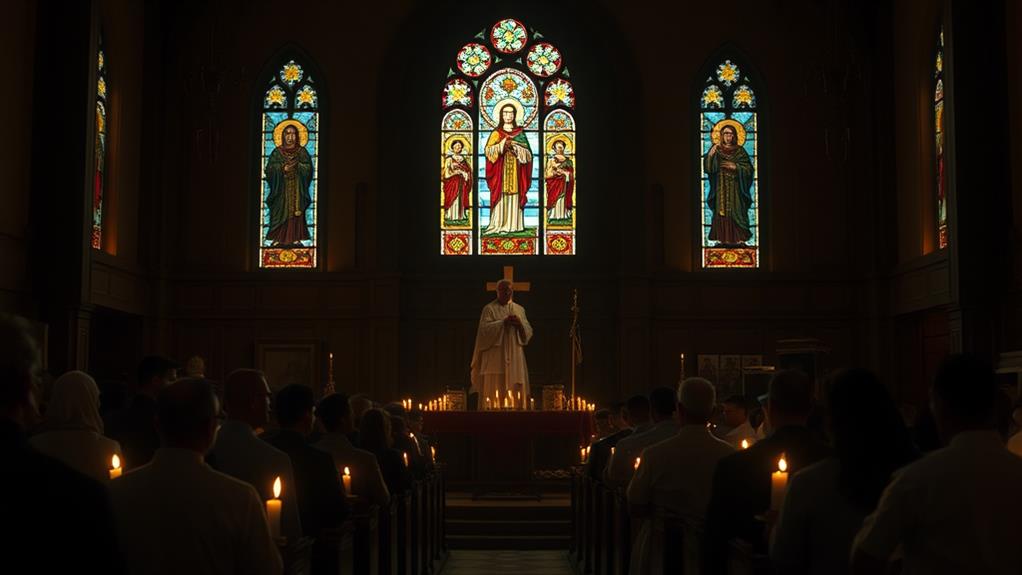
The Catholic Church's Role in the Marcos Era
During the Marcos Era, the Catholic Church navigated a complex landscape of power, dissent, and reform.
While some clergy maintained an apolitical stance, others actively opposed the regime, inspired by Vatican II's emphasis on social justice.
Cardinal Jaime Sin's Leadership
Cardinal Jaime Sin emerged as a crucial figure, advocating for civil liberties and mobilizing masses, particularly during the People Power Revolution in 1986.
His leadership highlighted the Church's commitment to social justice and democracy.
The Assassination of Benigno Aquino
The assassination of opposition leader Benigno Aquino in 1983 galvanized Church support for Corazon Aquino, demonstrating the Church's significant role in political activism.
This shift showcased the Church's influence on public sentiment against the corruption and repression of the Marcos administration.
Pope John Paul II's Visit
Pope John Paul II's visit in 1981, intended to bolster Marcos's image, inadvertently showcased the Church's independence and critical stance toward the regime.
The visit highlighted the Church's commitment to social justice and human rights.
The Church's Impact on Philippine Politics
The Church's involvement in social action was pivotal in fostering a collective movement that ultimately led to the ousting of the dictatorship and the restoration of democratic governance.
The Catholic Church transformed from a largely passive institution into an active participant in shaping Philippine politics.
Catholic Traditions and Community Practices
Catholic Traditions and Community Practices in the Philippines
Shaping Spiritual Beliefs and Social Interactions
Catholic traditions and community practices are deeply rooted in the daily lives of Filipinos, influencing not only their spiritual beliefs but also their social interactions. These religious traditions create a framework for moral choices and community life, fostering a sense of belonging among the faithful.
Unique Celebrations and Devotions
Major events like Christmas and Holy Week are celebrated with unique local customs, such as the Pahalik, where devotees express their devotion to the Black Nazarene by kissing the statue. Additionally, the widespread veneration of the Virgin Mary is marked by numerous feasts and novenas, which are nine-day prayers dedicated to her.
Catholic Educational Institutions and Social Activism
Catholic educational institutions like Ateneo de Manila University and De La Salle University contribute significantly to moral and values formation, often engaging in social activism initiatives for social change. These institutions play a crucial role in shaping the values and beliefs of the Filipino youth.
Regular Rituals and Community Bonds
Regular rituals, including Mass, reinforce community bonds and shared identity. The Mass is a central ritual that fosters community connection among the faithful. Confession is another important ritual that strengthens community bonds and promotes a sense of shared identity.
Syncretism and Cultural Enrichment
The blending of indigenous beliefs with Catholic practices further enriches Filipino culture, illustrating a unique syncretism. This blending of beliefs has resulted in a rich and diverse cultural heritage that is distinctively Filipino.
Traditions and Events
| Tradition/Event | Description |
|---|---|
| Pahalik | Devotees kiss the Black Nazarene statue |
| Novenas | Nine-day prayers dedicated to the Virgin Mary |
| Mass | Central ritual fostering community connection |
| Feasts | Celebrations honoring various saints and events |
| Social Activism | Initiatives led by Catholic schools for social change |
Social Justice and Political Influence
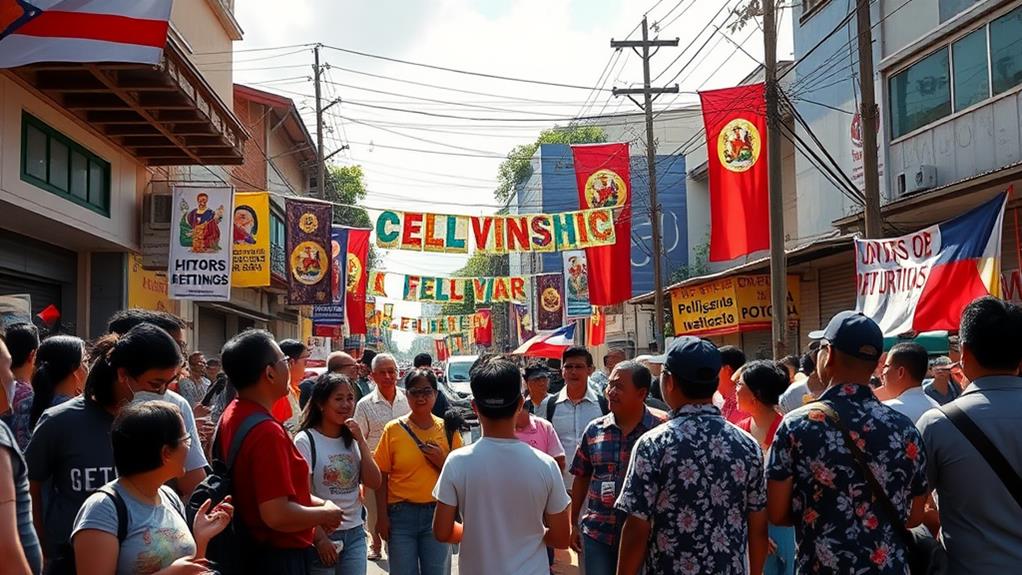
The Catholic Church plays a significant role in promoting social justice and political influence in the Philippines. With approximately 80% of Filipinos identifying as Catholic, the Church has a substantial impact on advocating for the poor and marginalized.
For instance, initiatives like Caritas Philippines demonstrate this commitment by promoting good governance and community support.
The Catholic Church has historically been involved in political matters. Bishops and clergy have voiced strong opinions on legislation, particularly regarding reproductive health and family planning.
During the 1986 People Power Revolution, religious leaders mobilized millions against the Marcos dictatorship, showcasing the Church's capacity to drive social change.
The Catholic Church is shifting towards more active political engagement. Recent political endorsements, such as the support for Vice President Maria Leonor Leni Robredo in the 2022 elections, indicate a notable shift away from the Church's previous stance of neutrality.
The Church's focus on social justice, particularly in response to pressing issues like poverty and human rights, underscores its significant influence in promoting civic responsibility and ethical governance.
Political Endorsements and Election Dynamics
The Catholic Church's Political Endorsements in the Philippines: A Shift in Influence
The Catholic Church in the Philippines has historically maintained a stance of political neutrality, but it recently departed from this tradition by endorsing Vice President Leni Robredo in the elections.
This shift was driven by concerns over governance issues, particularly with the candidacy of Ferdinand Bongbong Marcos Jr.
Despite its significant influence, with approximately 84% of Filipinos identifying as Catholic, the Church's endorsement of Robredo only secured victories in 18 out of 86 dioceses.
This outcome reflects a decline in the Church's influence as a moral compass for Filipino society.
The 2022 elections highlighted the need for the Church to reassess its political engagement strategies.
Collaboration with local communities is essential to restore the Church's relevance in political discourse.
Challenges of Church Involvement in Politics
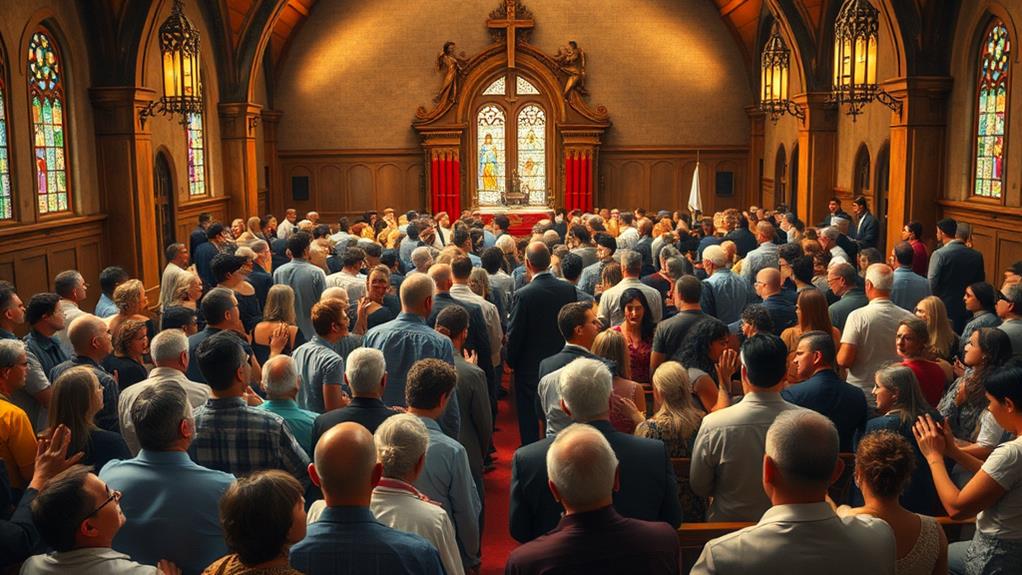
Challenges of Church Involvement in Politics
The Catholic Church in the Philippines faces significant challenges in navigating the political landscape, particularly with its recent endorsements.
The Church's political influence raises concerns about undermining the constitutional separation of Church and State. When Catholic priests endorse candidates, it questions voter autonomy and the moral authority of the Church.
The Church's declining influence is evident in the recent elections. Only 18 out of 86 dioceses backed candidates endorsed by the Church, raising doubts about its effectiveness in guiding political choices.
In contrast, other religious groups like Iglesia Ni Cristo mobilize their followers with clear political directives.
The Church must reassess its strategies in light of shifting public perception. As it confronts ongoing social justice issues, it must balance its spiritual guidance with political activism.
The Church must navigate these complexities to maintain its relevance without compromising its foundational principles.
Future Directions for Church Engagement
The Church's Evolving Role in Politics
The Church is redefining its engagement with political matters, shifting from neutrality to active participation.
Recent endorsements, such as supporting Vice President Leni Robredo, demonstrate this newfound commitment.
To strengthen its role, the Church may:
- Strengthen community governance initiatives, like Caritas Philippines' good governance program, to promote accountability and transparency.
- Enhance outreach efforts to reconnect with the laity, addressing past detachment and fostering a sense of community.
- Encourage civic engagement among parishioners, particularly on Election Day, to increase voter turnout and informed decision-making.
- Balance spiritual guidance with advocacy for political and social reforms, ensuring that moral principles inform policy decisions.
Guiding Congregations toward Informed Civic Participation
Church leaders recognize their role in guiding congregations toward informed civic participation, addressing the social, economic, and moral crises faced by the Filipino populace.
By evolving its engagement approach, the Church helps foster a politically aware community, ultimately aiming to influence governance positively.
Impact on Governance and Society
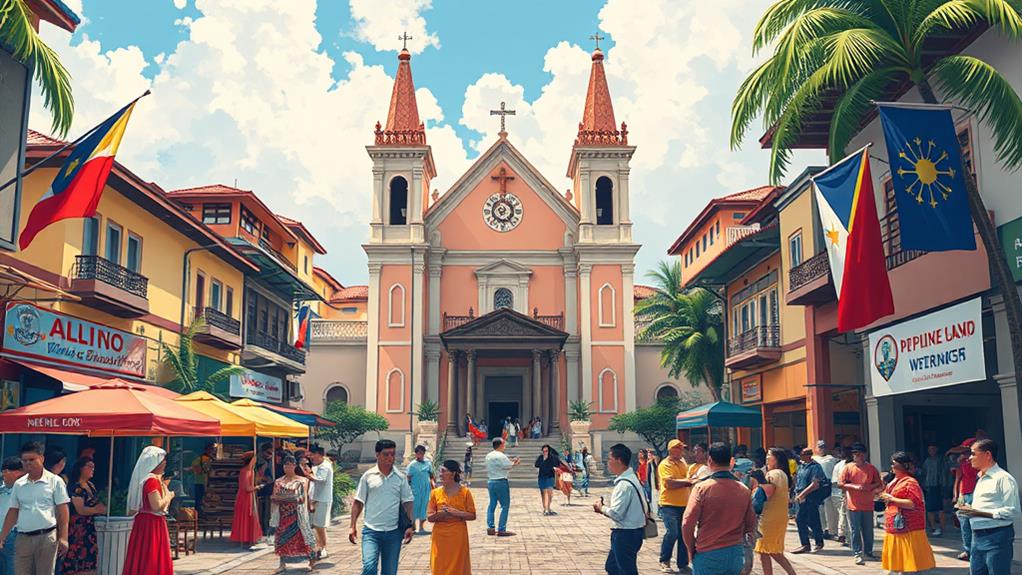
Catholicism's Impact on Governance and Society in the Philippines
The Catholic Church plays a significant role in shaping governance and societal norms in the Philippines, with approximately 84% of the population identifying as Catholic. This significant presence has led to the Church serving as a moral compass during times of political upheaval, such as the People Power Revolution in 1986.
The Church's Influence on Governance
The Catholic Church's influence extends to social justice issues, impacting legislation on reproductive health and human rights, which in turn shapes public policy. For instance, the Church has advocated for human rights and supported community welfare through initiatives like Caritas Philippines.
The Church's Influence on Society
The Church promotes ethical behavior and supports community welfare through its social justice initiatives. Additionally, Catholic educational institutions shape values education, fostering civic responsibility among Filipinos.
The Church's Role in Political Engagement
The Church endorses candidates in elections, encouraging informed citizenry and responsible governance. Through its initiatives, the Church counters misinformation, cultivates active citizenship, and reinforces the intertwined relationship between the Catholic Church and the nation's governance and societal values.
Questions and Answers
How Is the Catholic Church Important in the Lives of Filipinos?
The Catholic Church plays a vital role in the lives of Filipinos by providing spiritual guidance and fostering community support. This guidance helps shape moral values, instilling principles that influence daily actions and decisions. For instance, the Church's teachings on compassion and forgiveness encourage empathy and understanding towards others.
The Church's rituals and celebrations are deeply rooted in Filipino cultural identity. The Simbang Gabi, a nine-day novena Mass celebration before Christmas, is a beloved tradition that brings families and communities together.
Similarly, the Fiesta de Santo Niño, a festival honoring the Child Jesus, showcases vibrant processions and cultural performances.
Through its teachings and community engagement, the Catholic Church helps Filipinos navigate life's challenges. The Church provides counseling services, support groups, and charity programs, which offer emotional and material assistance to those in need.
Moreover, the Church reinforces a sense of belonging within a larger faith community, providing a network of like-minded individuals who share similar values and beliefs.
How Did the Catholic Church Influence Politics?
The Catholic Church influences politics by navigating the delicate separation of church and state relations.
The Church's political activism often focuses on social justice issues, providing moral guidance to both followers and lawmakers. For instance, it has advocated for the protection of refugees, the poor, and the environment.
Through endorsements and advocacy, the Church effectively shapes public opinion and policy, urging a focus on ethical governance.
This engagement reflects a broader trend where religious institutions assert their roles in addressing societal challenges, impacting the political landscape significantly.
For example, the Church has played a key role in shaping policy on issues like abortion, capital punishment, and healthcare.
How Did the Catholic Church Influence Society?
The Catholic Church plays a significant role in shaping society through its various influences.
The Church's faith practices influence how individuals and communities engage in spiritual life. For instance, the Church's teachings on prayer, sacraments, and sacred traditions guide believers in their daily lives. This moral guidance also helps individuals navigate ethical dilemmas, providing a framework for making informed decisions.
Through community support initiatives, the Church fosters a sense of belonging among its members. Parish-based programs, such as food banks and charitable organizations, bring people together to support those in need. This collective effort promotes solidarity and social cohesion.
Moreover, the Church advocates for social justice, encouraging its members to address inequalities and champion the rights of marginalized groups. By promoting values such as compassion, equality, and fairness, the Church reinforces collective values and strengthens community ties.
How Does Religion Affect the Philippine Society or Culture?
Religion plays a significant role in shaping Philippine society and culture. It influences the moral values and social norms of the community, guiding daily interactions and fostering unity.
Through religious practices, vibrant cultural festivals are celebrated, bringing people together. For instance, the Sinulog Festival in Cebu and the MassKara Festival in Bacolod are examples of religious festivals that promote unity and celebration.
These events often strengthen community support by bringing together families and friends.
Religious beliefs instill values that guide daily life, promoting compassion and cooperation. For example, the Catholic Church's teachings on kindness, forgiveness, and charity encourage Filipinos to be compassionate towards one another.
These values ultimately strengthen societal bonds and enhance the rich tapestry of Filipino identity.